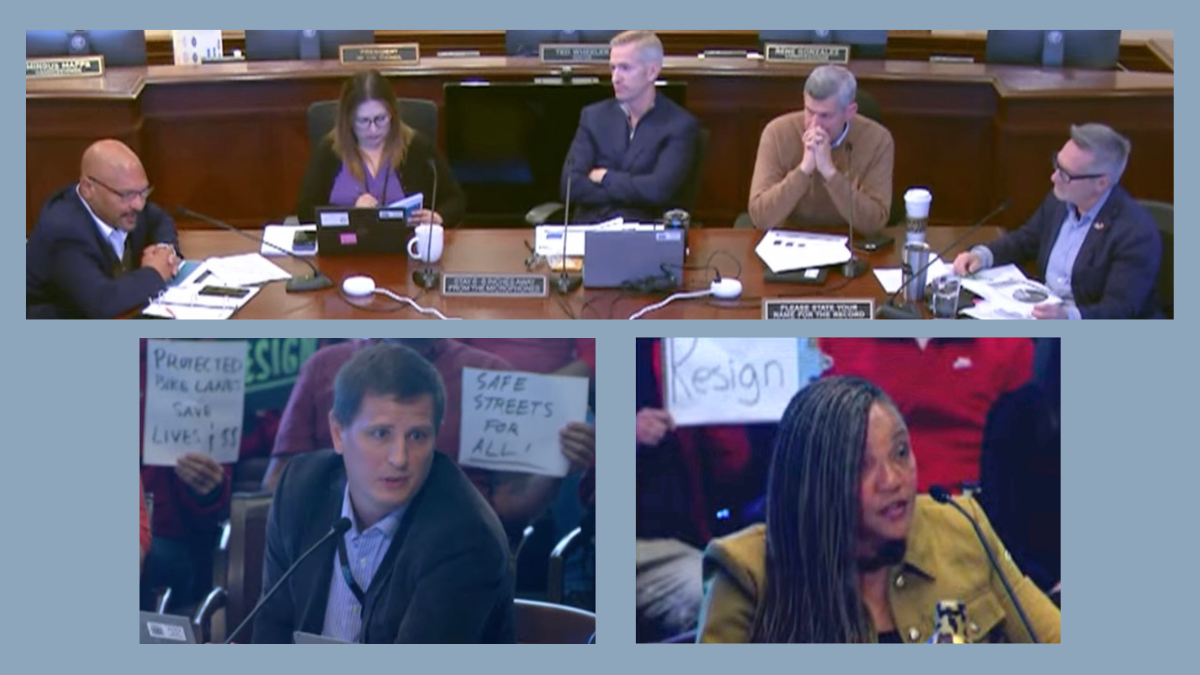 Scenes from the work session in council chambers this morning. Activists from BikeLoud wore red and held signs.
Scenes from the work session in council chambers this morning. Activists from BikeLoud wore red and held signs.
Sunday Parkways, Safe Routes to School, the 823-SAFE hotline, basic maintenance, 127 full-time jobs, landslide cleanup — yes landslides! — were are all put on the chopping block in City Council chambers this morning as the Portland Bureau of Transportation presented its budget at an annual work session.
Commissioner Mingus Mapps, PBOT Director Millicent Williams, and top-level staff painted a bleak picture for Mayor Ted Wheeler and the rest of council. It was the first major public step in the agency’s journey to cut nearly one-third of its discretionary budget — or find new revenue to prevent an unprecedented reshuffling that would be felt by PBOT and throughout city government.
But what was that about landslides?
“We are eliminating all landslide repairs and any major emergency repair work on structures,” said PBOT City Engineer Todd Liles as he laid out cuts under consideration by the Engineering Services group he manages.
“What does that mean?” Mayor Wheeler asked.
“They’ll sit there,” Liles replied. “We need to come up with some money to do that.”
“Sorry I asked,” replied the Mayor.
If you’re shocked at the level of cuts under consideration, consider this: PBOT’s budget looks big on paper when you see the $509 million top-line figure. But just $147 million of that is actually available to the bureau to use as discretionary (no strings attached) funding. And even within that $147 million slice of pie, about $48 million is tied up in debt service and other commitments.
That leaves just $99 million left to run the 800-person agency, implement programs, maintain the 5,000 lane miles of roads, 159 bridges, 60,000 street lights, and so on. This year, PBOT is being asked to cut $32 million from that $99 million in order to balance their books. That’s because of a perfect storm of factors that includes a loss of revenue from parking fees and gas taxes (pushed down further due to the pandemic) and a big increase in material and construction costs due to inflation — and it follows five years of difficult belt-tightening.
The budget is so bad that PBOT has been asked to rewrite their strategic plan, because they cannot fulfill their current plan with the funding they have.
Director Williams, who sat in front of a sign that read “Resign” that was held by someone protesting her involvement in the Broadway Bike Lane scandal, put the situation in simple terms: “We either cut $32 million from the $99 million available next year, or find a solution or combination of solutions, to fill the gap. If we must make a $32 million cut, you will not have the Portland Bureau of Transportation as you see today.”
After Williams laid out the problem for council members, managers of PBOT’s seven different groups shared the specific cuts and layoffs they would be forced to make.
But before I get into that, Williams was asked a notable question by Commissioner Rene Gonzalez.
“I ride my bike or take the train 90% of the time downtown,” Gonzalez said. “Are [car] drivers subsidizing me in our current revenue model? I pay for my bike in maintenance but I don’t pay a fee to to bike every day. My TriMet pass has been provided to me at less than I think the cost of my usage is in a year. So that’s the question: am I being subsidized by drivers?”
“Yes you are. Yes,” replied Director Williams.
“So what’s the solution? How do we better reflect the cost of supporting cyclists and those who use public transit?” Gonzalez asked.
Williams then said it’s a “complex conversation” and then listed a few ideas on how to adress it. “There are a number of ways that we could get to having the whole of community supporting the transportation network,” she said. “So there are more opportunities for us to explore and discuss that with you.”
More strategies for raising revenue were discussed later in the work session, but let’s get back to the cuts.
Below are the slides that went with each group director’s presentation about their planned cuts:
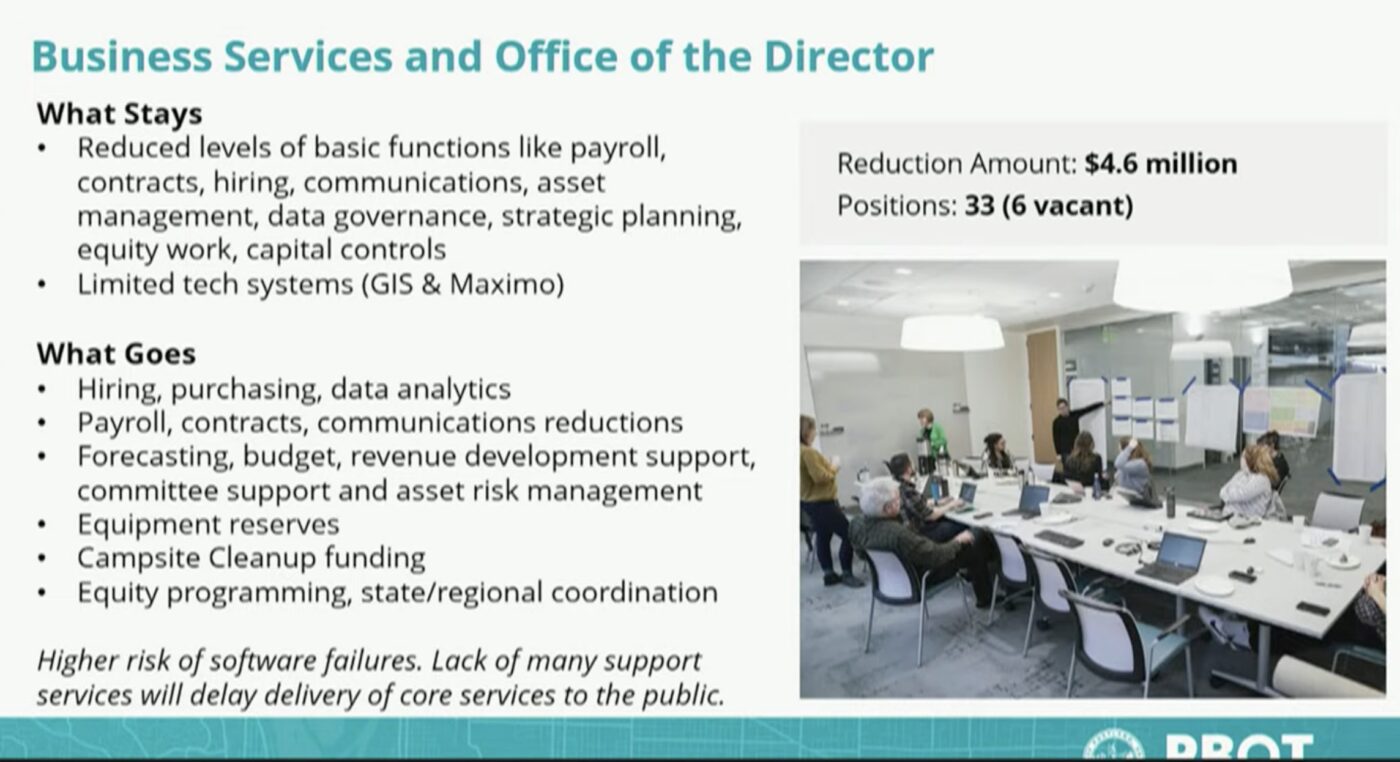

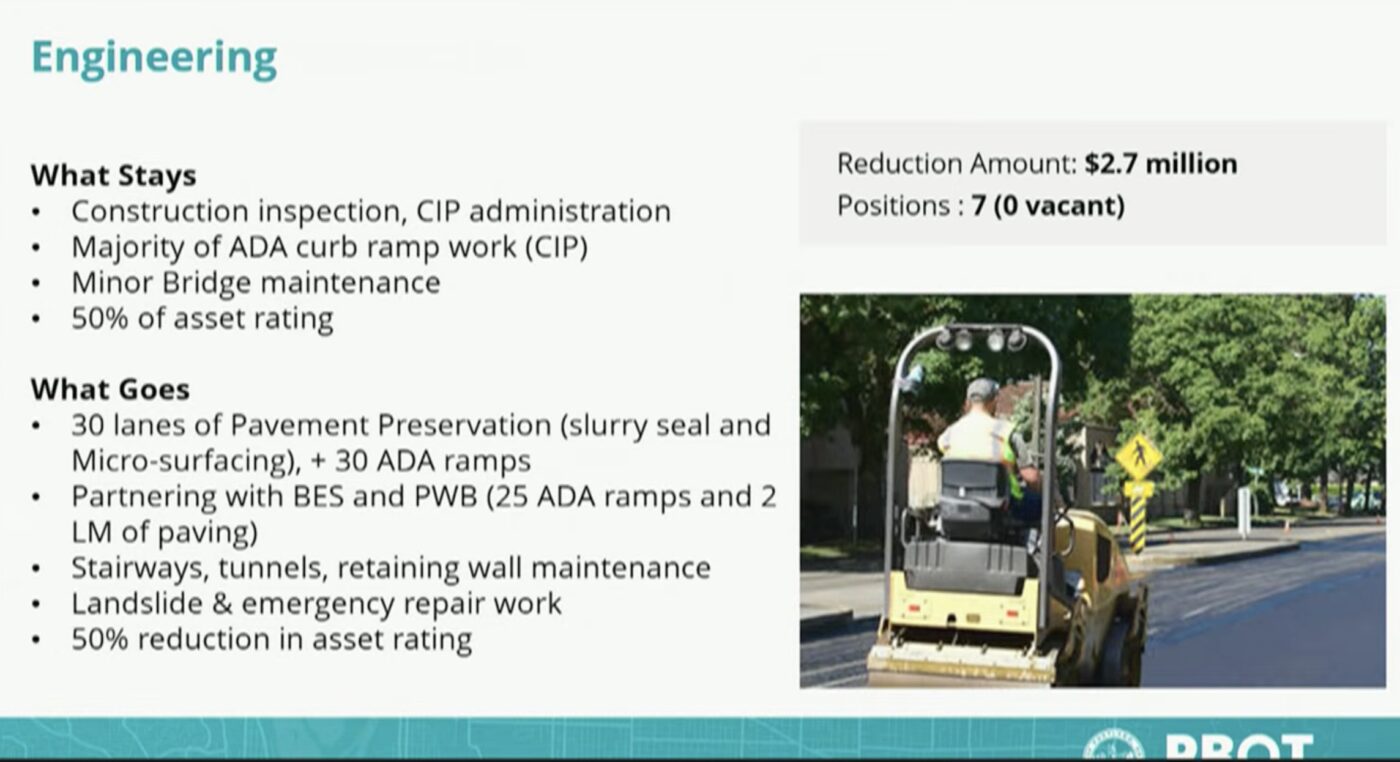
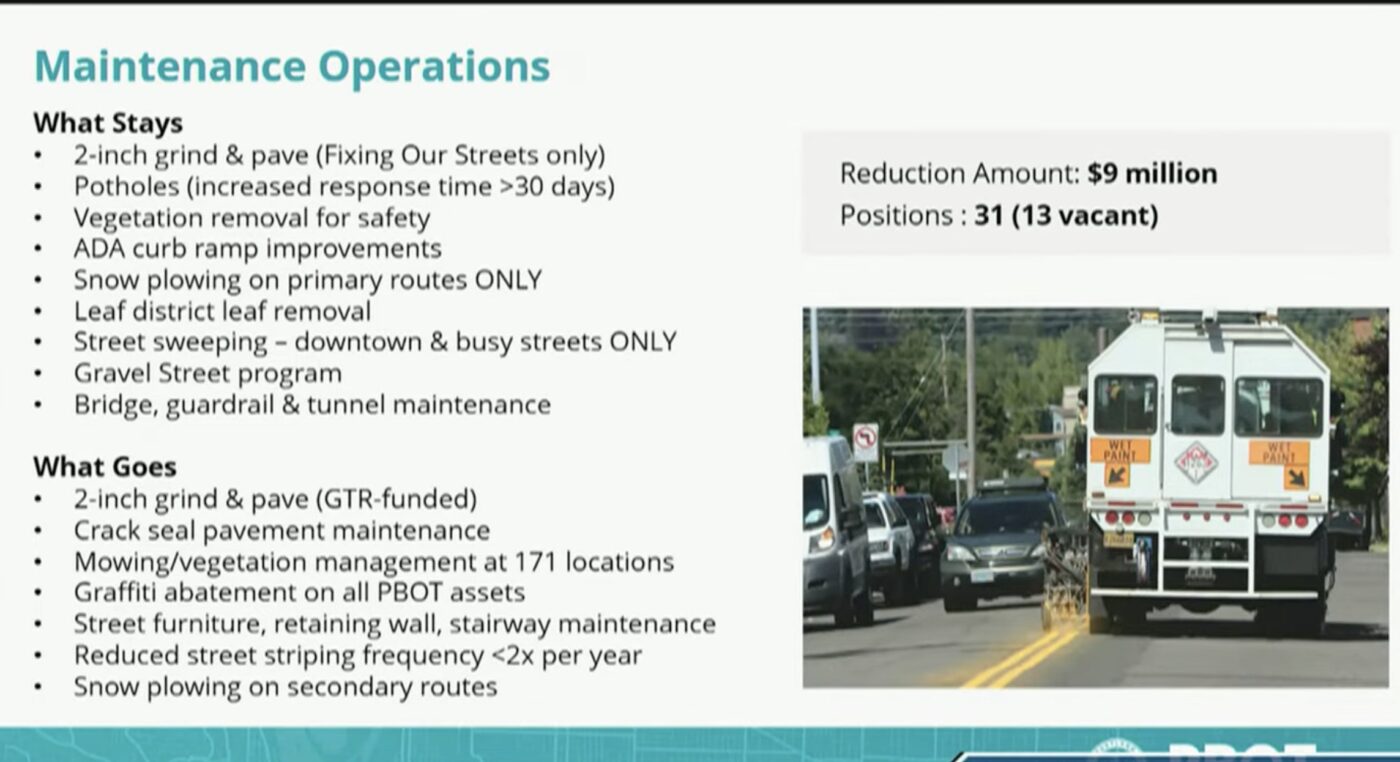
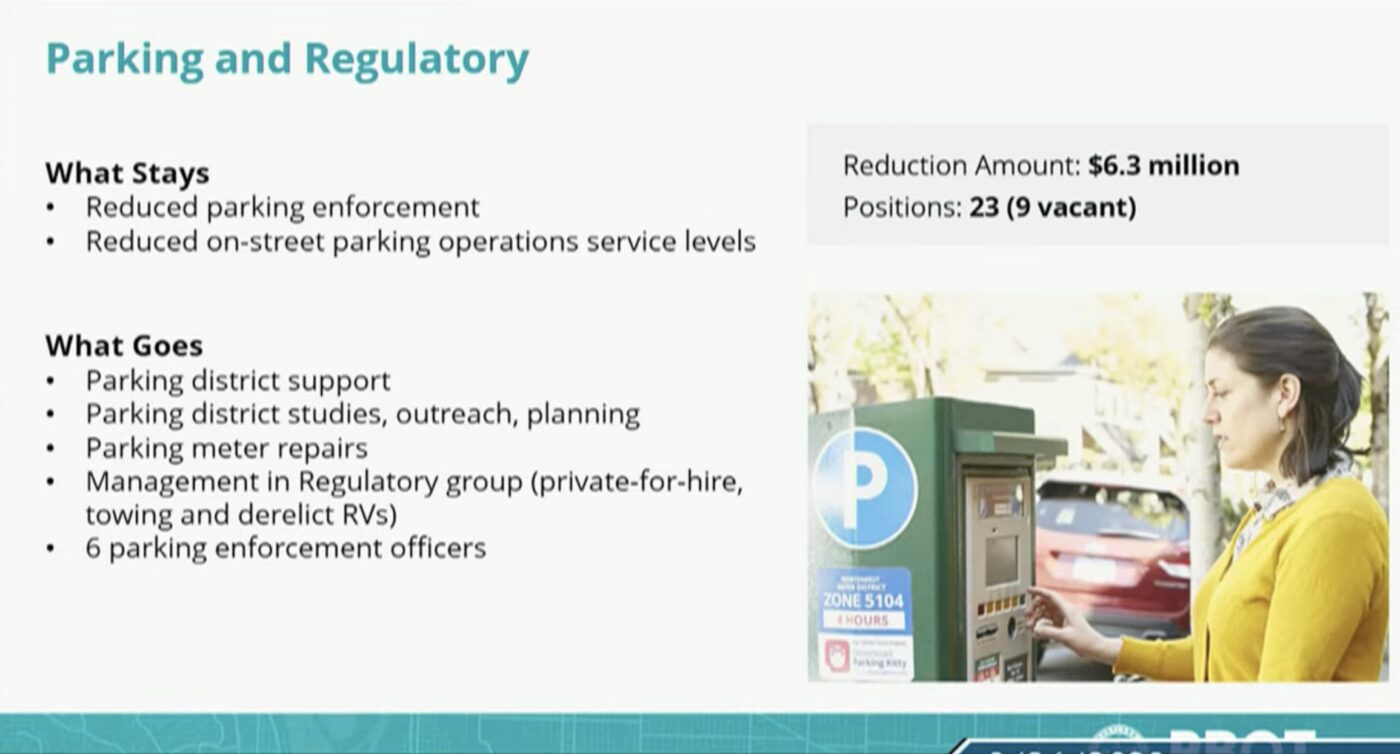
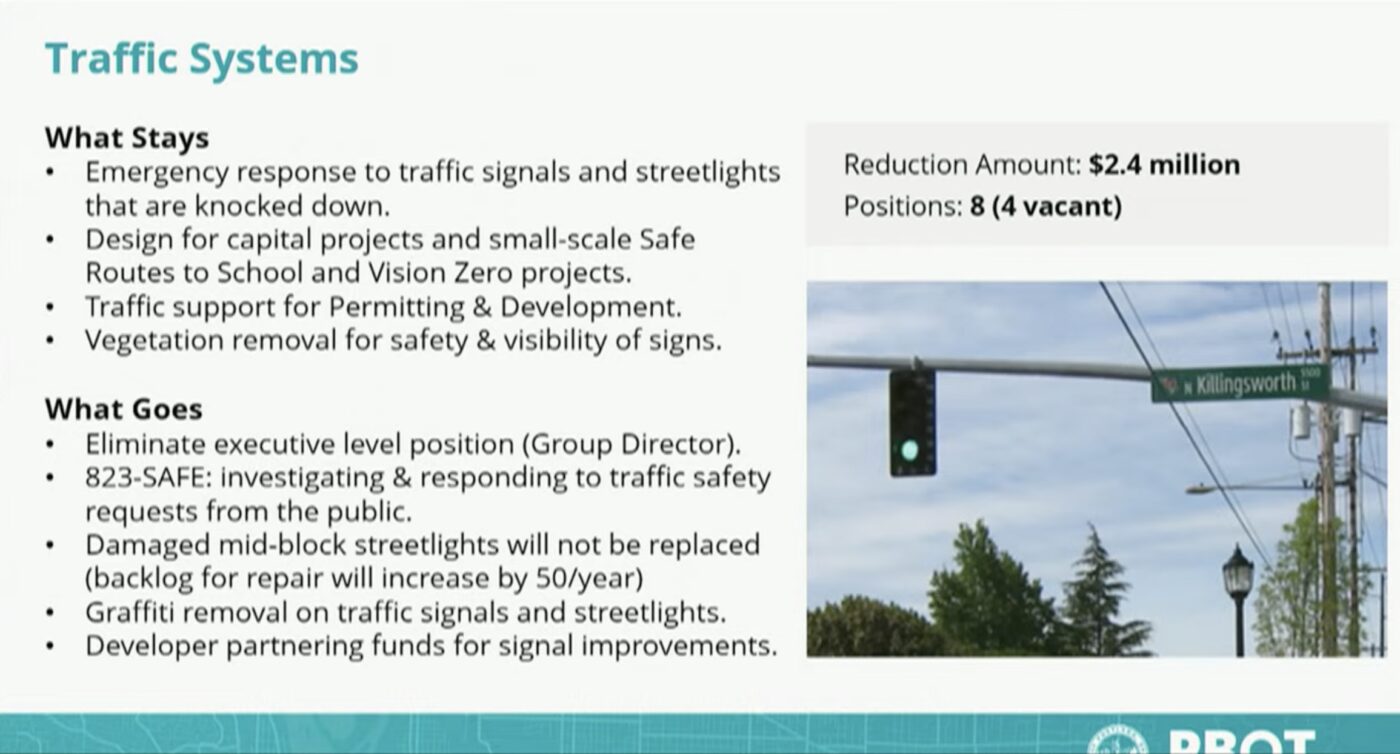
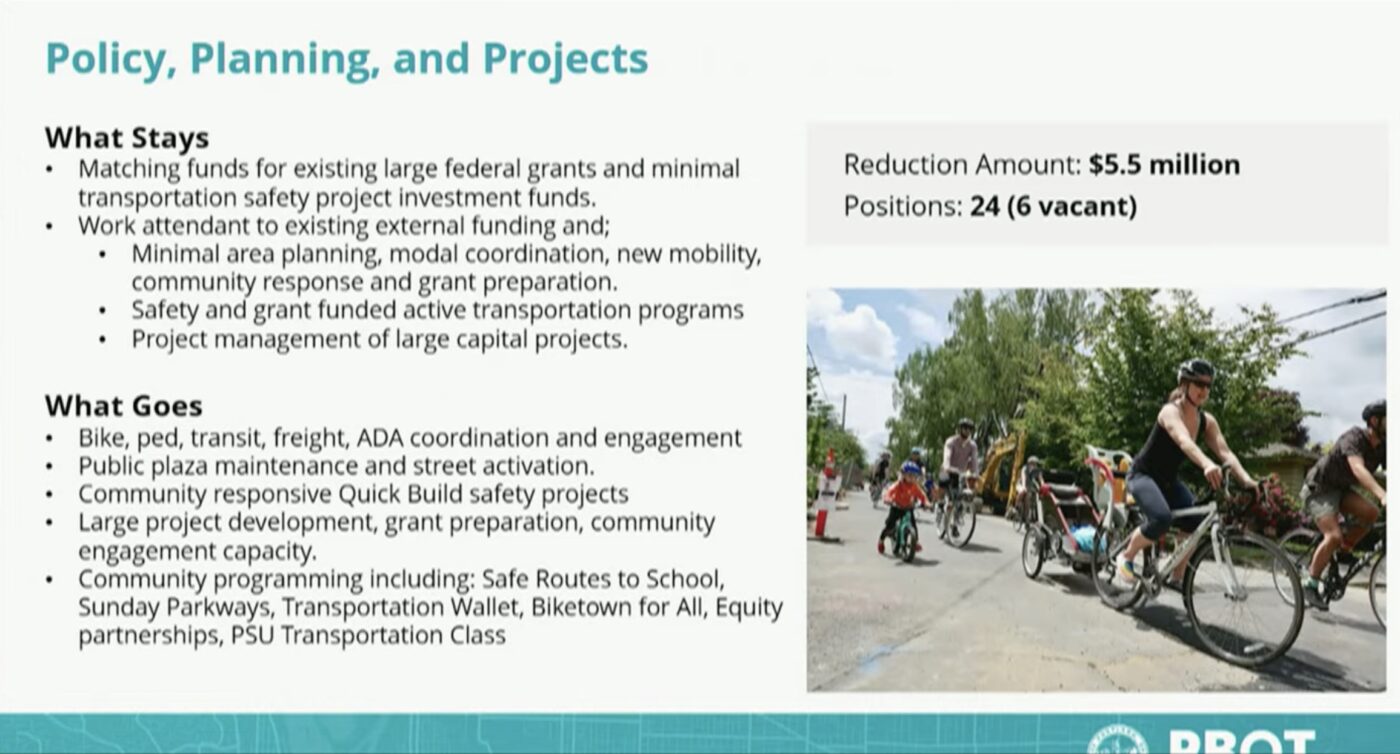 Slides shown by PBOT at the session.
Slides shown by PBOT at the session.As you can see, there are some very notable cuts and layoffs on the table. They include:
Removal of subsidies for street fairs, community events, farmers markets, etc… Reduce funding for Portland Streetcar Complete reduction of stairway and tunnel maintenance (will only do structural repairs) Elimination of all landslide and other major emergency repair work 50% reduction in street paving Less vegetation management (meaning more branches and bushes into the bike lanes) Reduction of snow plowing and lane striping Dozens of family-wage jobs Laying off six parking enforcement officers PBOT would no longer support its three modal committees (Bicycle, Pedestrian, Freight) Time to respond to key project grants Sunday Parkways and other popular programs 823-SAFE public safety requests and investigations Fewer damaged, mid-block streetlights will be repaired and so on and so forth.No one on council wants to see these cuts happen. Since so much of PBOT’s work is connected to other bureaus, there would be ripple effects felt citywide. What can be done about it?
There was a lot of talk about how PBOT might tap into some of the $750 million Portland Clean Energy Fund Climate Investment Plan. That plan will be adopted by council at their meeting tomorrow and PBOT (along with other bureaus) are circling around it like vultures. PCEF is already going to fund PBOT’s Transportation Wallet program, but will PCEF’s advisory committee support a larger ask from PBOT? That remains to be seen.
The end of PBOT’s presentation to council was the big ask for new funding sources.
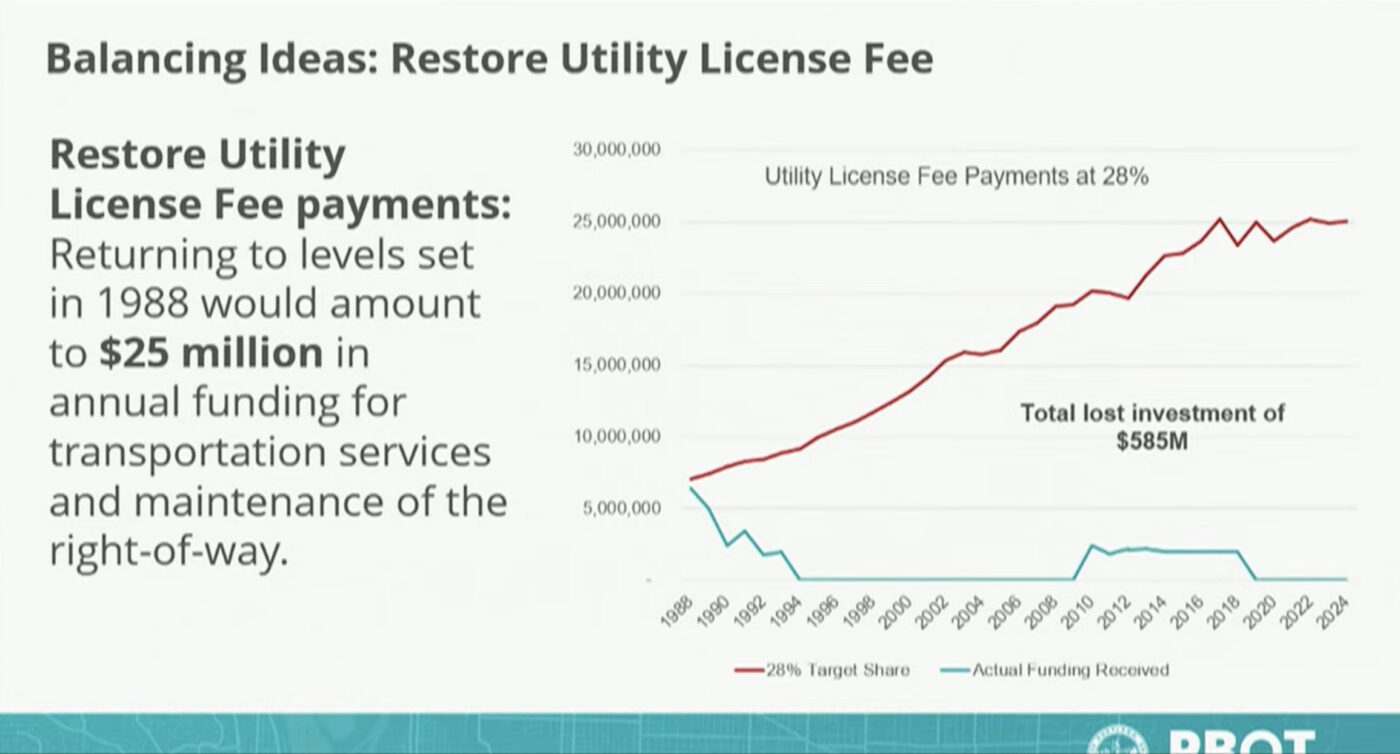
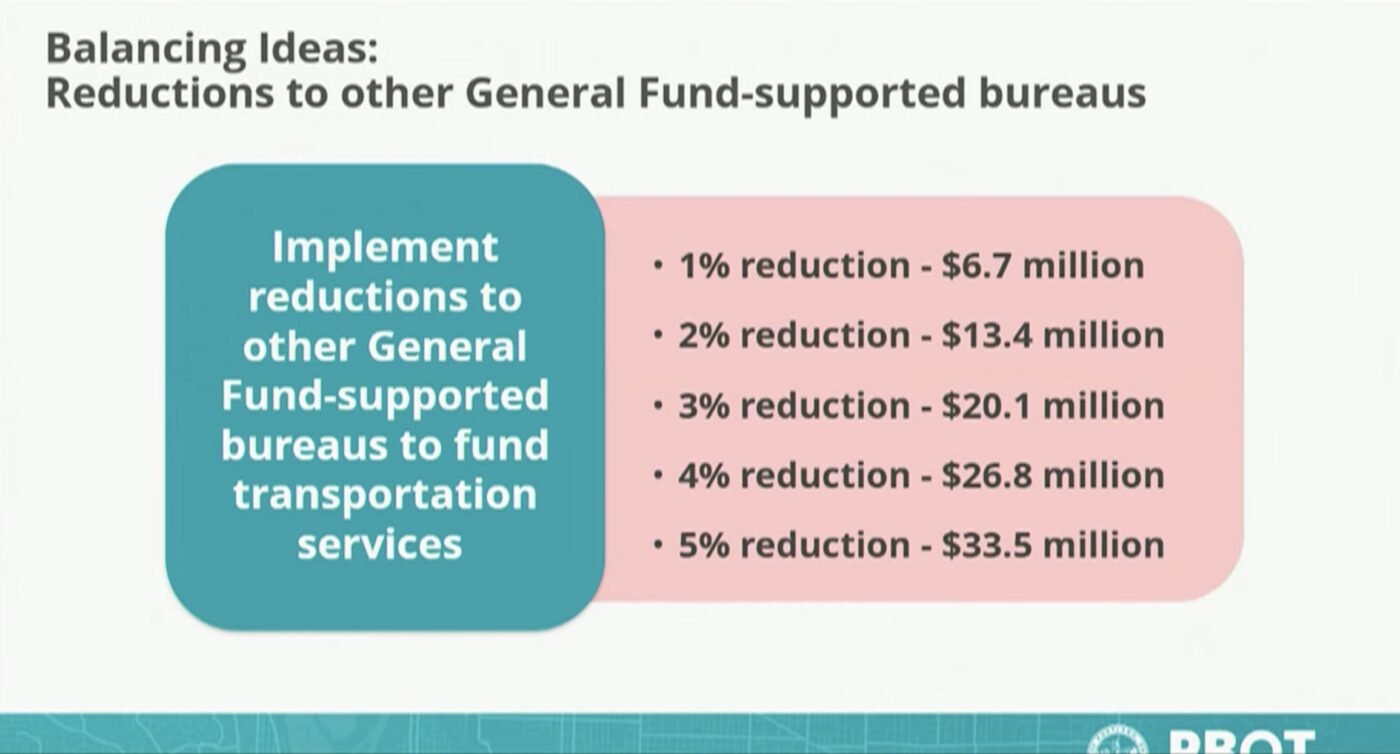
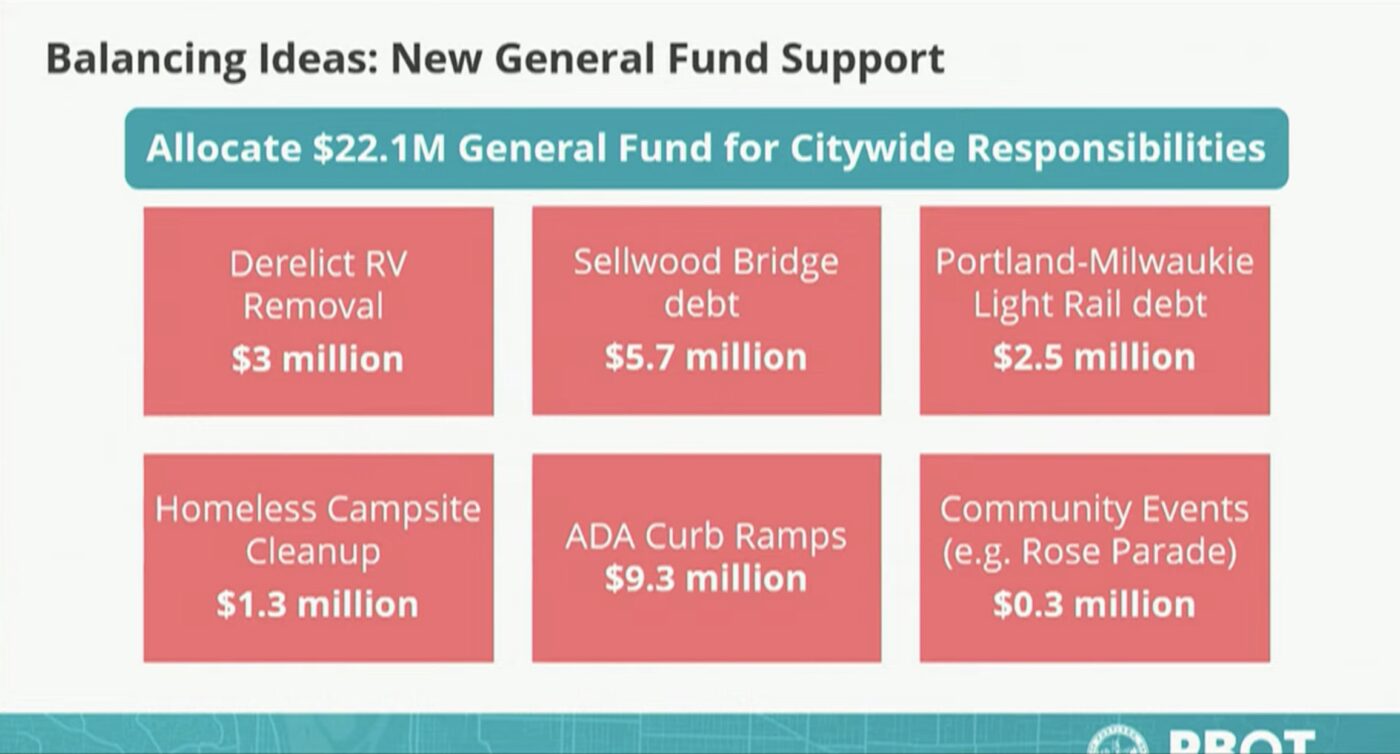
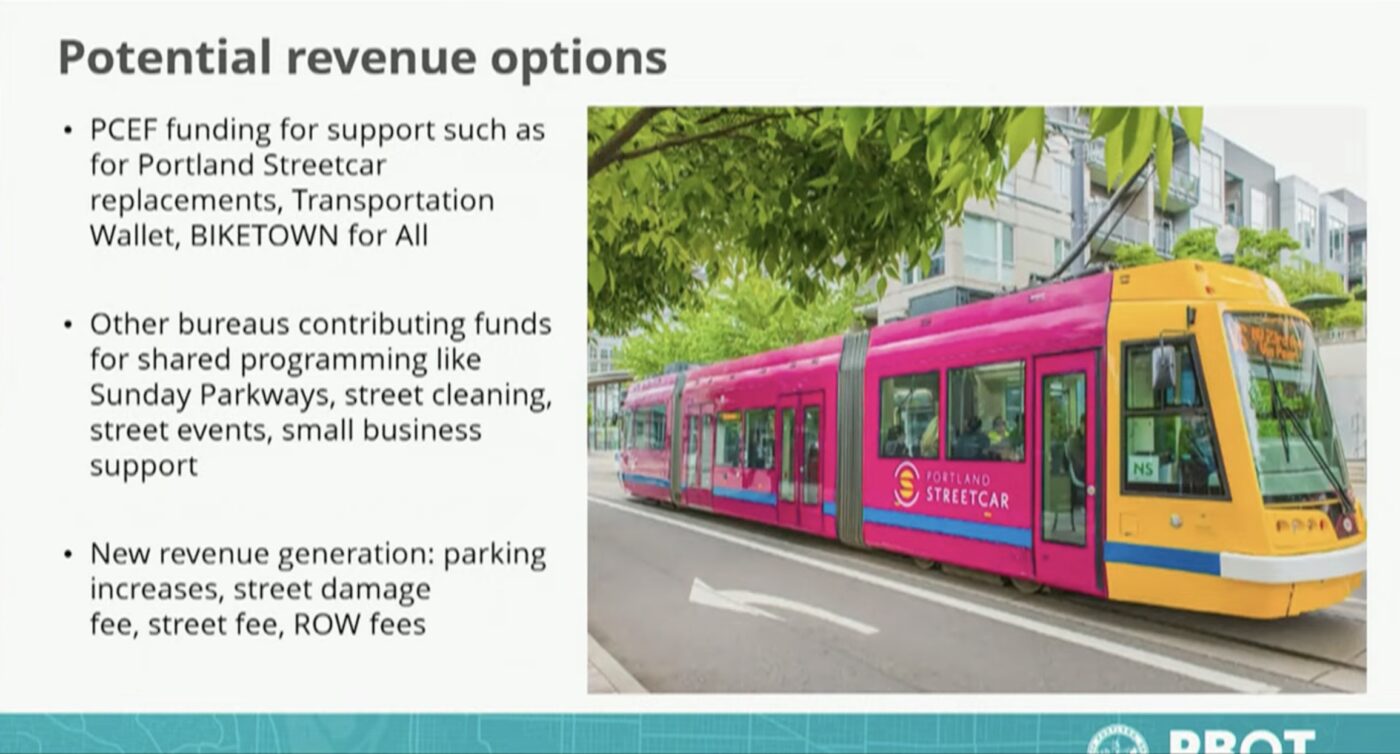
A big one PBOT is targeting is the Utility License Fee (ULF), which are fees collected by the city from utilities that use the right-of-way (a natural relationship to PBOT). Back in 1988, when transportation funding was separated from the city’s General Fund, PBOT was promised 28% of this fee as a replacement. But over the years, these funds were siphoned away into other bureaus. PBOT estimates they’ve lost $585 million since 1988 and they want some of this money back. In a slide shown by Director Williams, PBOT expects they could net $25 million per year if council restored the ULF to 1988 levels.
“This restoration could be directed by council now to avoid PBOT cuts,” Williams said. “But yes, there would be an impact on other bureaus.”
As expected, PBOT also made an ask to reduce other bureaus’ funding from the General Fund in order to pay for transportation. If all other bureaus reduced their General Fund budget by 1%, PBOT could receive $6.7 million. A 5% reduction would net PBOT $33.5 million.
Offloading certain annual expenses — like homeless camp cleanup ($1.3 million), Sellwood Bridge debt ($5.7 million) and derelict RV removal ($3 million) — could result in an additional $22 million for PBOT.
These are just some ideas PBOT floated at the work session. Now the real negotiations and debates will likely begin among Mayor Wheeler, Commissioner Mapps, and the rest of council to come up with a solution.
While Wheeler and Commissioner Gonzalez said they would absolutely not support using any Public Safety funding for PBOT, it sounded like there was a genuine interest from all five members of Council to collaborate on this crisis.
“What I can do in my role is to be transparent with you,” Commissioner Mapps said in his closing remarks. “And today is the beginning of that dialogue.”

